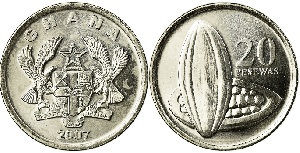Business News of Thursday, 8 May 2025
Source: www.ghanawebbers.com
The rejection of the 20-pesewa coin: A silent driver of inflation
In Ghana, four zeros were removed from the currency. This introduced a new cedi (GH₵) worth 10,000 old cedis. The change also brought smaller coins: 1, 5, 10, 20, and 50 pesewas. These coins aimed to make transactions easier.
Initially, there was optimism about the new coins. However, they quickly fell out of favor with the public. By 2010, many consumers and vendors refused to accept coins below 10 pesewas. They found these coins insignificant and inconvenient.
Over a decade later, this rejection has led to inflation issues. The lack of acceptance for smaller coins has fueled rising prices across the economy. Coins like the 5, 10, and even 20 pesewas are now rarely used in transactions.
Vendors often refuse these coins while customers avoid them altogether. Businesses no longer price goods considering these small denominations. Banks have also stopped keeping these coins in their vaults.
A study by Amoako-Agyeman & Mintah (2014) showed that market traders abandoned smaller denominations due to handling difficulties and customer resistance. The phrase “the value is the same” lost meaning as prices adjusted upward over time.
Public discussions indicate a widespread rejection of coins below 50 pesewas. Many view these denominations as burdensome or irrelevant. Vendors often round prices up to avoid dealing with small change.
For example, items priced at 15 or 18 pesewas are now sold for either 20 or 50 pesewas instead. This trend leads to several economic issues:
1. Upward Price Stickiness: Prices rarely decrease because of insufficient small change.
2. Distorted Market Pricing: Businesses set prices based on available coin denominations.
3. Erosion of Purchasing Power: Consumers face higher prices for basic goods like sachet water and lorry fares.
This inflation isn't solely due to cost increases but also behavioral changes in pricing practices (Aryeetey & Baah-Boateng, 2015). For instance, a ball of kenkey that cost 10 pesewas in 2007 now sells for GHS6—a staggering increase of nearly 5900%.
Inflation is typically linked to macroeconomic factors like money supply and exchange rates. However, public perceptions about low-denomination coins contribute significantly to inflation too.
This situation exemplifies what economists call menu cost-induced inflation—where price increases stem from behavioral frictions rather than supply shocks (Mankiw, 1985).
Even minor price increases can erode consumer purchasing power over time—especially for low-income households facing daily purchases.
Moreover, this trend undermines confidence in the currency's usability and divisibility—the very reasons behind redenomination efforts initially made.
Today it’s the rejection of the 20-pesewa coin; tomorrow it could be the GH₵1 coin next in line for disregard. This pattern reflects Ghana’s recent history with its lower denomination coins disappearing from circulation entirely.
If this continues unchecked, Ghana risks moving toward a situation where GH₵5 becomes the lowest transactional denomination available as lower notes fade out—an early sign of hyperinflation.
While current inflation may not meet classic definitions—like exceeding monthly rates of over 50%—it contributes to creeping hyperinflation through rising costs on essential goods (Hanke & Krus, 2013).
As smaller denominations fall out of use and higher ones take their place, consumers will face increased costs for basic items like sachet water—which now costs around four times more than before.
In an ideal pricing system, such items should cost only a few pesewas but are no longer viable due to impracticality surrounding small coin usage that has faded away completely.
Before redenomination occurred in Ghana back in late-2007 during Corporate Finance classes discussions predicted long-term effects on currency usage patterns based on behavioral economics principles observed then.
Some students anticipated that undervalued cultural perceptions would lead gradually towards vanishing smaller currencies causing distortions within pricing mechanisms fueling future inflation trends—a prediction now coming true today reflecting monetary policies' impact alongside public psychology shaping norms around pricing behaviors observed currently across markets nationwide!
To address these challenges effectively requires careful consideration beyond mere price controls which historically bring enforcement challenges along unintended consequences (Tanzi ,1991).
The Bank of Ghana and government should consider sustainable approaches such as:
- Reintroducing education campaigns highlighting small denomination values.
- Creating incentives encouraging businesses accepting exact change.
- Minting higher quality physical characteristics into new coin designs.
- Promoting micro-digital payments via mobile money or QR codes allowing precise pricing without needing physical cash exchanges.
- Regulating essential item prices rationally reflecting realistic points (e.g., around five or ten pesewas).
- Monitoring sectors where rounding practices occur frequently tracking trends regularly through commissioned studies assessing ongoing coin usage patterns effectively!
Policymakers must recognize how public sentiment influences transactional behavior impacting long-term monetary stability overall! Ignoring this issue risks undermining economic inclusiveness alongside price stability crucially needed moving forward together collectively!
In conclusion: While redenominating cedis seemed necessary at first glance; its unintended consequences continue unfolding today! Rejecting small-value currencies might appear trivial—but cumulatively drives significant inflationary pressures affecting everyday lives negatively experienced throughout society presently!
With one-, five-, ten-pesewa pieces already rendered obsolete recently growing rejections against twenty-pesewa notes signal powerful forces nudging upward pressure onto overall pricing structures distorting market signals adversely impacting equity levels economically speaking!
It’s imperative policymakers engage closely addressing subtle forms influencing broader economic landscapes decisively protecting integrity surrounding Ghanaian currency systems sustainably going forward into future endeavors ahead!











